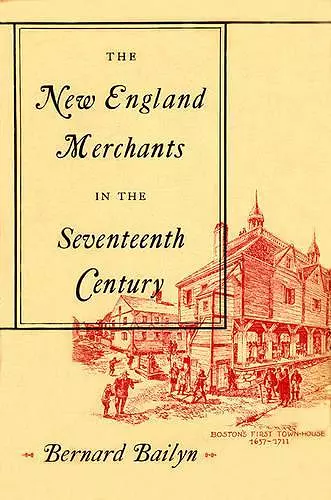The New England Merchants in the Seventeenth Century
Format:Paperback
Publisher:Harvard University Press
Published:15th Dec '79
Currently unavailable, and unfortunately no date known when it will be back

By the middle of the eighteenth century the merchants were dominant figures in the northern American colonies, powerful economically, politically, and socially. But in New England this preeminence had not been present in the first years of settlement; it had been achieved in the course of three generations of social development as the merchants often Puritans themselves, rose within the Bible Commonwealths to challenge the domination of the Puritan fathers.
In lively detail Mr. Bailyn here presents the struggle of the merchants to achieve full social recognition as their successes in trade and in such industries as fishing and lumbering offered them avenues to power. Surveying the rise of merchant families, he offers a portrait in depth of the emergence of a new social group whose interests and changing social position powerfully affected the developing character of American society.
The story of this group is the story of people and of their many–sided interests. The merchants were united by the demands of their common devotion to trade, yet they did not form a socially homogeneous unit. In fact their social differences—created in the confusions and dislocations of the early days of settlement came to play an important role in their business and political activities. Moreover, their commercial ventures, successes, and failures affected their social and political situation. Internationalists by occupation, they were deeply affected by personal relations with Europeans as well as by events in the Old World.
Drawing on source material from many fields—business records, religious and political data, literary remains, and genealogical information—Mr. Bailyn has discovered much that is new about the merchants, and has brought it all together into a composite portrait of our economic founding fathers that is fascinating in itself and that will reorient our thinking about many aspects of early New England history.
This study should be of great interest to sociologists interested in social stratification, religion, and political behavior. The author has analyzed in detail the way in which the growth of trade in seventeenth century New England led to the emergence of an upper class based on mercantile wealth, and the gradual disintegration of the Puritan Commonwealth. * American Sociological Review *
In the past, the social history of seventeenth-century New England has been written in terms of the Puritan Zion, not of the marketplace. The interaction of these two forces—meetinghouse and counting-house—is the basic problem to which Mr. Bailyn has devoted this excellent book…It is social history as it has seldom been written and business history as it should be written—a story of people, not of prices and trends; of merchants, not mercantile houses. * American Historical Review *
ISBN: 9780674612808
Dimensions: unknown
Weight: 408g
264 pages